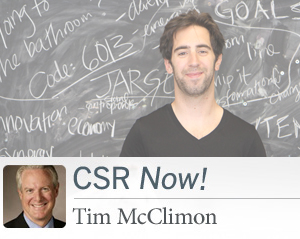
Last year, I predicted that the following were five CSR trends to watch in 2014:
- Growing use of social media for a cause.
- Growing importance of thinking globally but acting locally.
- Growing emergence of big data to aid with decisions and disclosures.
- Growing demand for disclosure.
- Growing skepticism that CSR really makes a difference.
Clearly, 2014 was the year of using social media for a cause. The huge impact of the "Ice Bucket Challenge" social media campaign during the summer was unprecedented, and possibly unrepeatable, but no one thinks that the over $100 million raised for this cause would have happened any other way. Now, every nonprofit organization on the planet is searching for its own social media campaign and many have now awakened to the potential power of crowd funding.
Issues of disclosure, transparency and data security were also with us all year, and the flap over Sony's short-lived decision to not release the comedy film "The Interview" heightened everyone's awareness of the potentially negative uses of huge amounts of data as well as what constitutes a socially responsible company — with some suggesting that issues of free speech should trump a company's efforts to protect its employees and customers from harm.
This year, there are a number of global trends that will impact the work of CSR professionals and the efforts of companies to be perceived as concerned about the environment, human rights and profitability all at the same time. My picks for five of these trends are:
- An improving global economy. While there have been some recent setbacks such as currency valuations issues in Russia and a slowing economy in China, many economists are predicting an improving economy worldwide. "Positive fundamentals are in place for the momentum in the global economy to improve during 2015," according to Nariman Behravesh, Chief Economist at HIS, a global investment firm. He expects global growth to increase to 3 percent from an estimated 2.7 percent in 2014. This should be good news for most companies, but global competition will continue to push bottom-line concerns and force many companies to do more with lower costs to compete.
- An increasing commitment to sustainability. According to the Kjaer Global Trend Snapshots 2015, we consume 26 times more than we did 150 years ago, but only 28 percent of people know what terms like "sustainable," "responsible," "eco-friendly" and "green" really mean, and just 44 percent trust green claims from big brands. Nonetheless, issues of sustainability are growing in importance in a number of industries, including hospitality, finances, restaurants and retailing. A recent survey by the National Restaurant Association found that 42 percent of respondents thought environmental sustainability would be the hottest menu trend 10 years from now. As the economy improves, people naturally turn their attention to quality of life issues, and the sustainability movement is bound to benefit from this development.
- An increasing focus on income inequality. As we approach the 2015 target date for the United Nation's Millennium Development Goals, the first target - halving the proportion of people living in extreme poverty globally - has already been met. However, issues of extreme - and growing - income inequality persist. According to the United Nation's World Economic and Social Survey, global income inequality has receded slightly in recent years, but inequalities within many countries have been rising. In fact, more than two-thirds of global inequality is explained by differences in income between countries and only one-third by the distribution patterns within countries. A number of government leaders around the world have taken up the mantel of income inequality as a winning political strategy, and the upcoming presidential election in the United States is sure to focus attention on the issue.
- A fresh look at conscious capitalism. A number of surveys have shown that people want to work for companies that are making a positive difference in the world, and increasingly consumers want to buy from these companies and investors want to invest in them. At the same time, people remain deeply skeptical of what companies say about their responsible behavior. Companies will need to do a better job of telling their stories in fresh and innovative way in order to break through the clutter and convince consumers and investors of their authenticity. Disclosure and transparency aren't enough, and often traditional advertising goes too far. So, new approaches to communicating and building reputation will need to emerge.
- A serious look at disruptive companies. While the idea of disruption in the marketplace has garnered sizeable investments from venture capitalists and generally favorable notices from the media, increasing financial and public relations issues with a number of disruptive companies are leading some to question whether all disruption is good. A recent New York Times article highlighted a number of new socially conscious investment firms such as Robinhood and Aspiration, which target younger and middle-class Americans with lower fees or even "pay what you think is fair" campaigns. However, some are questioning whether putting disruption ahead of profits is always a good thing. "There are disruptive forces for good, and then there's disruption for the sake of disruption," said Joshua M. Brown, a financial advisor at Ritholtz Wealth Management, who worked as a stockbroker for over a decade and now runs a blog called The Reformed Broker. "I worry that some of these new things are like, 'We have a bunch of money from venture capitalists. What's a profitable thing that we can give away for nothing?'" It remains to be seen whether these disruptive companies can position themselves as socially responsible and if emerging social enterprises can withstand similar critiques.
This post was originally published as part of the CSR Now! blog, which examines what’s happening in Corporate Social Responsibility today from the point of view of a corporate practitioner. It is reprinted here with permission.










